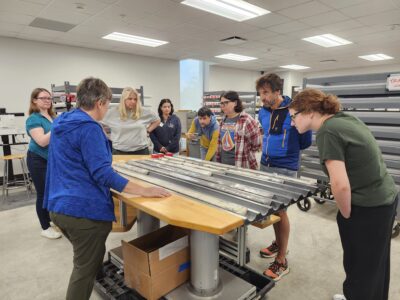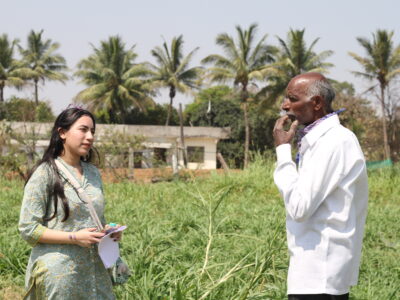
The need for organizations across all sectors to address sustainability issues has fostered a growing demand for trained professionals. Columbia University’s MS in Sustainability Management program, designed by the Earth Institute and the School of Continuing Education, trains students to fill this growing demand.
MS in Sustainability Management student Emily Briggs recently answered questions about her experience in the program. Prior to her enrollment as a full-time graduate student, Emily oversaw the strategic direction and management of the Natural Step Canada’s Sustainability Learning program as well as the facilitation and animation of the Exchange – a learning network for sustainability professionals in Canada. She has experiences in planning, incubating and managing the Sprout e-course for TakingITGlobal, a program designed for aspiring social innovators and environmental entrepreneurs to grow project ideas and learn to create lasting changes in their communities. Emily entered the program this fall as a fulltime student.
What drew you to the Master of Science in Sustainability Management?
As a young professional, I was looking for a program that would help me build on my previous experience and equip me with the latest knowledge and relevant skills to excel in this fast moving field. I was impressed by the program’s comprehensive and interdisciplinary structure and the breadth of courses it offered. Moreover, the program’s affiliation with the Earth Institute meant that students would be able to take advantage of a multitude of resources to enhance their educational experience.
What do you intend to do professionally once you achieve your degree?
My true passion lies in facilitating multi-stakeholder collaborative processes for making large-scale, transformational change toward sustainability. Most sustainability consultants work with one organization at a time, and while that’s incredibly important work, can you imagine the possibility of working with an entire industry association or a complex supply chain? Now that’s meaningful change. This really stems from my interested in group dynamics and organizational development – the art and science of how today’s organizations will evolve and work together in order to thrive in tomorrow’s realities.
What do you think is the most important sustainability challenge?
I think of challenges as the barriers preventing us from moving from where we are today to our sustainable future. There are an infinite number of them, some more prohibitive than others. I think there’s a fair bit of consensus that we’ve painted ourselves into an unsustainable corner and if we’re going to continue to thrive going forward, we need creative, knowledgeable professionals that understand how we got here, where we need to go and how to get there effectively.
What skills and tools have you acquired through the program so far?
I cut my teeth in strategic management, so I’ve really been enjoying the opportunity to shift gears and dig into the scientific underpinnings of sustainability. It’s incredible how many lessons the private and public sectors can take from the natural world and its systems.
Beyond the classroom, what extracurricular sustainability related have you engaged in with your fellow Sustainability Management students?
I have the great privilege of being on the Executive Council for the Student Association and it’s been an absolute pleasure to work with (and for) my fellow students. We have such a rich and diverse student body and I’ve loved getting to know their needs and helping them get the most out of their time in the program.



